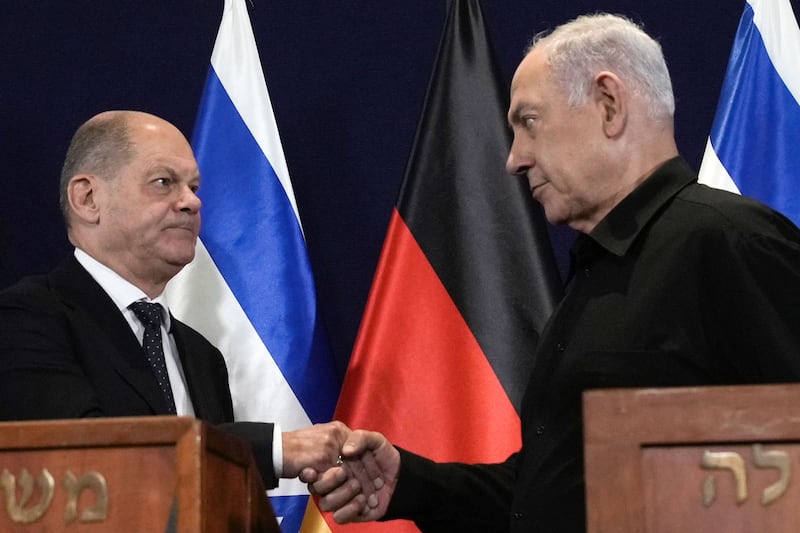Friedrich Merz was five minutes into his speech when the tears came. It was last Monday at the reopening of a renovated Munich synagogue and the 69-year-old German chancellor was recalling the Nazi-era persecution and murder of about six million European Jews, including up to 180,000 in Germany.
Voice breaking, he asked: “Did no one help the Jews?”
Merz was quoting back to Rachel Salamander, the driving force behind the renovation, sitting in the front row, a question she recalled asking as a child in Munich of her Holocaust survivor parents.
Regaining his composure, Merz continued: “Even today we must acknowledge, to our outrage, that most people didn’t help.”
In his speech, Merz rededicated Germany to its postwar historical obligation to support and protect Jewish life in Germany – and stand by Israel.
But his tears betrayed a deep-seated personal conflict – for him and for many other Germans: how to honour another postwar commitment to universal human rights in light of the Israeli military campaign in Gaza?
While Merz avoided addressing Gaza directly in Munich, his conservative ally Markus Söder, Bavaria’s state premier, did so to loud applause, including from Israeli ambassador Ron Prosor.
“If Hamas gives up its weapons and releases the hostages, there will be peace tomorrow,” said Soder.
“If Israel gives up its weapons, the next massacre will come.”
Germany has been on an unprecedented and uncomfortable journey since the Hamas-led attacks on Israel of October 7th, 2023, left 1,200 people dead with at least 250 people taken hostage.
The shock and horror at the worst loss of Jewish life since the Holocaust hit hard among the heirs of its perpetrators.
Soon after expressions of sympathy came action, including arms exports to Israel worth €485 million in the first 18 months of the conflict.
A year ago, however, doubts – and criticism – of Israel’s strategy in Gaza – and its human cost – began to creep in over a civilian death toll that – through military strikes, hunger and disease – has now passed at least 65,000.
The last months have seen a considerable shift in public sympathy. Some 63 per cent of Germans now consider Israel has gone too far in its military reaction. And just 36 per cent of Germans think their country has, because of its history, a special responsibility to Israel.
But asked who they hold responsible for civilian suffering in Gaza, and allowed to give more than one answer, 69 per cent said Israel and 71 per cent said Hamas.
 German chancellor Olaf Scholz and Israeli prime minister Binyamin Netanyahu in Tel Aviv on October 17th, 2023. Photograph: Maya Alleruzzo/AFP via Getty Images
German chancellor Olaf Scholz and Israeli prime minister Binyamin Netanyahu in Tel Aviv on October 17th, 2023. Photograph: Maya Alleruzzo/AFP via Getty Images
Mirroring shifting public opinion, a first visible policy pivot came last October. The administration of Olaf Scholz demanded – and secured – a letter from Israel promising not to use any imported German weapons for human rights violations or genocide.
Then-opposition leader Merz denounced the move – but he has shifted since taking office in May and delivered his first public rebuke just weeks later. “What the Israeli army is doing in the Gaza Strip, I no longer understand the goal. To harm the civilian population in such a way … can no longer be justified as a fight against terrorism,” he said.
Last month, in response to Israel’s plan to take Gaza City, the Merz administration even announced restrictions of its own, halting arms exports that could be used in the Gaza Strip.
Critics pointed out that the move would not apply retroactively to export permits already issued – and did not apply to the occupied West Bank.
As the situation in the Middle East deteriorates, however, the political temperature in Berlin continues to rise.
At Wednesday’s government press conference, journalists peppered officials with 24 separate questions on Germany’s Israel/Gaza policy.
[ What would the suspension of the EU-Israel trade deal mean?Opens in new window ]
Asked why Germany is unlikely to back fresh EU sanctions against Israel, on the agenda for next month’s European Council, Merz spokesman Stefan Kornelius said Berlin prefers more targeted measures than broad sanctions and is anxious to keep open communication channels to Israel.
“The expectation that sanctions or measures will lead to a change in Israel’s policy may be exaggerated,” he said.
Off the record, government officials are more robust about Israel. “What if we condemned Jerusalem on Thursday. Would that change anything on Friday?” asked a senior CDU official.
On Wednesday, Berlin officials were peppered with questions, too, about the 72-page UN commission of inquiry report that Israel is committing genocide in Gaza – charges Israel has rejected and Germany is trying its best to avoid.
A German foreign ministry spokesman described the UN report’s claims as “very shocking” but said it was “up to [international] courts to decide about such claims”.
Pressed by journalists, the spokesman declined to say if Berlin’s position has changed since 2023, when it drew on a similar report on the Rohingya genocide to join an intervention at the International Court of Justice against Myanmar.
In a joint written declaration two years ago with France, the Netherlands, Denmark and France, Germany noted “that the Genocide Convention requires States Parties to prevent the crime of genocide and hold those responsible to account”.
While German officials avoid describing Israel’s actions in Gaza as genocide, foreign minister Johann Wadephul called Israel’s new Gaza City military operation this week as “going in the completely wrong direction”.
“We reject this, the right path now is the one to a ceasefire talks and finding a deal for the release of hostages,” he said.
Unlike the government’s rhetorical shift, no movement is likely in the chancellor’s CDU parliamentary party. This week, influential CDU MPs denounced “half-baked” proposals by their party colleague Ursula von der Leyen, now European Commission president, to suspend an EU-Israel free trade deal.
CDU politician Armin Laschet, head of the Bundestag foreign policy committee, said ending this co-operation was “unprecedented and would split Europe”.
As well as Germany, previous efforts to sanction Israel have been blocked by Italy, the Czech Republic, Hungary and Austria.
Laschet noted the EU Commission maintains relations with many controversial states, even supports dictatorships financially, “but only with Israel is such an approach being taken, and that is unacceptable”.
Another robust CDU voice is Roderich Kiesewetter. He denounced the Merz weapons move last month as a “huge mistake”, warning the coalition against falling for Hamas’s “cognitive warfare … and the reversal of perpetrator and victim roles”.
“It is necessary to stand unwaveringly at Israel’s side,” he added.
The CDU/CSU parliamentary party line has triggered pushback from the centre-left Social Democratic Party (SPD). Berlin’s junior coalition partners have appealed to Merz to face down his party and join the European mainstream.
“Given diplomacy doesn’t work with [Binyamin] Netanyahu, our request is that the federal government at least lifts its [sanction] blockade at the European Council,” said Adis Ahmetovic, SPD foreign policy spokesman, on public radio. “No one is demanding that we are the loudest in demanding sanctions against the Israeli government but we have to adjust our path in Europe.”
